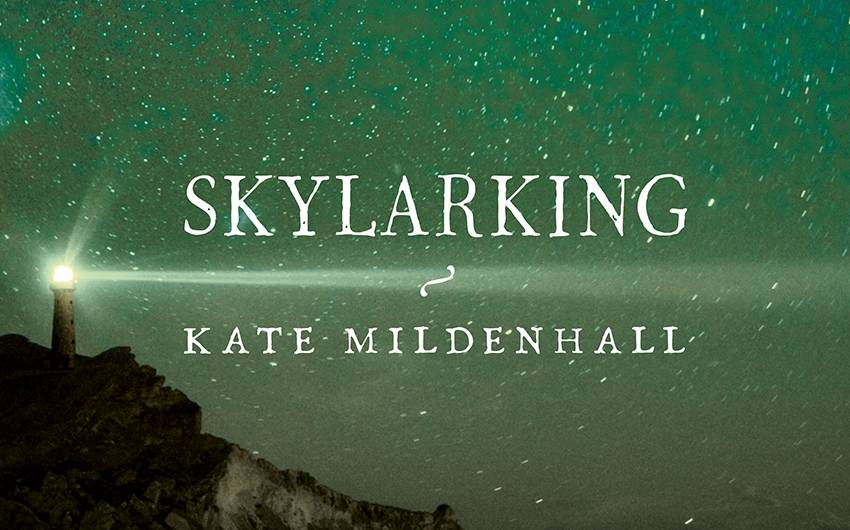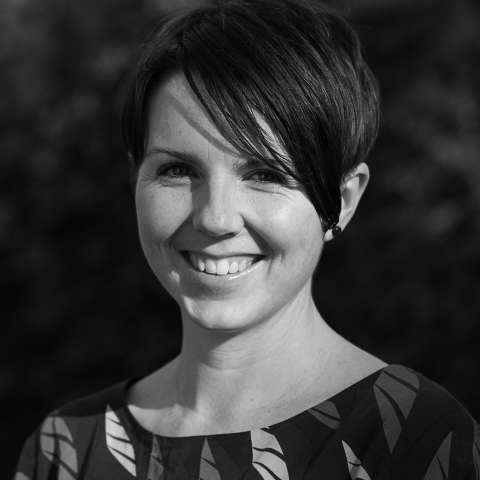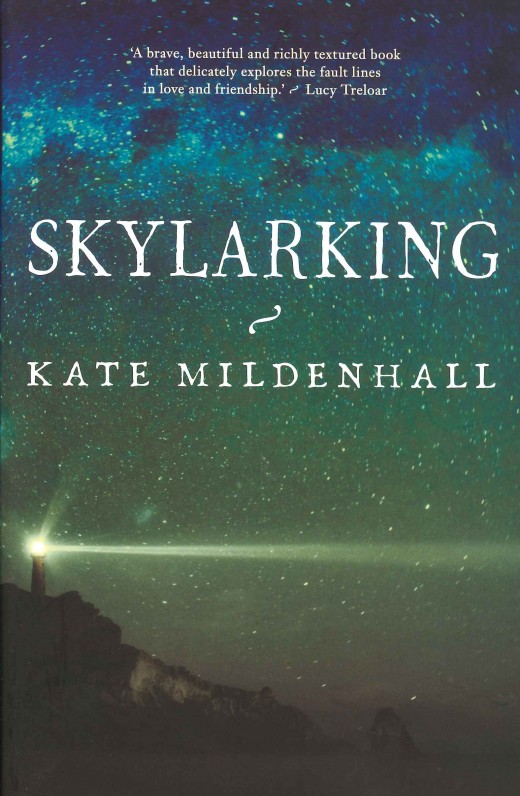News

News > Extract
Read an extract from Skylarking by Kate Mildenhall
Skylarking is the debut novel from Kate Mildenhall, based on true events that occurred near Jervis Bay between two best friends, Kate and Harriet, in the 1880s. Lucy Treloar called it ‘a brave, beautiful and richly textured book that delicately explores the fault lines in love and friendship’. It is Aviva Tuffield’s first acquisition for Black Inc. and has a stunning, heart-breaking ending.
In August, Kate will appear at Byron Bay Writers Festival, Bendigo Writers Festival and Melbourne Writers Festival, as well as several bookshop events in Melbourne. Kate works at State Library Victoria and lives in Hurstbridge with her family. Read an extract below.
Prologue
The sky was clear and blue forever that day. Clear and blue and so bright. Sunlight fell through the leaves, forming dark shadows and spots so blindingly white they forced me to look away. Harriet had packed a picnic: some ginger cake, half a loaf of soda bread, a square of butter wrapped in waxed paper. It seemed the beginning of something, this day – the sun, our being together again, making our way down the track to McPhail’s hut.
I remember our chatter. I remember her grip on my wrist. I remember her veering from the track, pointing towards the hut, the absence of smoke from the chimney. I remember the empty echo of our knocks on the door. I remember letting ourselves in. I remember the hat, and the voice I used, strange and deep, that I pulled from somewhere inside me to make her laugh. Always, always, to make her laugh.
I remember the way Harriet turned, breathless, laughing, a strand of her golden hair caught on her bottom lip.
After that, I try not to remember.
One
They chose a good spot for our lighthouse. High on the layered stone of a cliff face that jutted out, decisively, into the ocean; it was the kind of location that seemed confident, arrogant enough for a lighthouse. The dusty scrub of the headland stood hardly as high as the height of a man. While the sky was often endless and vivid, as soon as you left the grassy green slope of the lighthouse paddock, you could feel trapped and airless in the twiggy underbrush of the ti-tree and the thick canopy that blocked out the sky and muffled the sound of the waves. From the edge of the cliff, or as close to the edge as I had ever dared to go, there was only ocean and ocean and ocean, stretched out in the silky blue of a lady’s skirt, all the way to the horizon.
I was nine, Harriet eleven, when we first clambered out over the stone wall to stand on the farthest point. It was one of those days where the sun glare made my eyes ache, and the sky was clear in a great arc, but the wind off the sea whipped any heat out of the day and forced watery tears down my cheeks. We had already taken our turn at dragging the bedding into the laundry in great piles and heaving the sodden mass out again to be thrashed dry by the nor’westerly. Now we were free.
We knew the rules about the wall and the cliffs, and the warnings we’d been told since we were small about how easily we could tumble over the cliff’s edge and be dashed upon the rocks below, or swallowed up by the waves or, worse still, gnashed in the jaws of a great white shark. As a child, the threat of what lay beyond that wall was enough for me. Sitting in the latrine that had been built high out on a ledge over the sea, I could look down between my legs and see the foaming white froth spill over the rocks far beneath me. I would swallow hard and feel a roar in my ears until I could fix my gaze upon the swinging wooden door.
So I had kept away from the cliff. But now Harriet and I thought we were the oldest and wisest young ladies of the colony. What Harriet had in her two years of seniority to me, I made up for in bravery and cheek. You couldn’t have picked it then; it was only later, when it was obvious Harriet was becoming a young woman and I was yet to outgrow my childhood body, that you’d have said she was clearly the eldest.
‘Bet you’ll never go beyond the wall,’ I said to Harriet as we lay on the grass.
‘Probably not.’ Harriet was a lazy type of beautiful, sweet and curly and far too used to being mollycoddled by her mother. She didn’t see the point in doing anything outlandish; she didn’t feel the fire as I had begun to. At least, she didn’t feel it then.
‘I would do it.’
‘No, you wouldn’t, you just say that. You’ve a big mouth, Kate Gilbert, but you’re not as brave as you think.’
A blush burned up my cheeks. I hated that I was laid bare before her.
‘I’ll tell you what the view is like when I get back.’ I scrambled up and stomped towards the lighthouse and the stone wall that lay beyond.
‘Kate, I didn’t mean it. Please don’t. Your mother will be livid.’
‘I don’t care,’ I called over my shoulder into the wind.
I knew she would chase after me – she always did. By the time I was at the low rock wall, she was beside me, breathing hard.
‘Come on, Harriet! I won’t fall if you hold my hand,’ I said as I stepped over.
She glared at me but hooked her leg over the low wall and followed me through the prickly heath towards the edge. Only that few feet closer to the sea, and the sound was magnified, a crashing thud that echoed up through the solid rock and vibrated in my body and my ears. I was consumed by it. It was as though a single thread had been plucked from my dress and stretched all the way to the cottage where Mother would be bustling about in the kitchen. It held me, but it was thin, and it blew out in an arc like a spider’s silk in the wind. I reached for Harriet’s hand and told her where to place her black boots as we inched forwards in the shifting stones.
I was a lighthouse girl and I had stood on the edge of cliffs before, but not this one, and never so high up. Harriet stopped and let go of my hand as we got closer, spooked by the buffeting wind and the sudden space that was opening up before us where the edge of the rock dropped into nothingness.
‘Kate, this is far enough. We’ve seen it; we’ve gone further out than the boys. It could crumble away.’ Harriet was frozen, white hands gripping a salt bush that would do nothing to hold her if she slipped.
‘I want to see over the edge,’ I shouted, and my mouth filled with cold air as the sound was snatched away from me.
‘Well, I’m not going any further. You’ll get yourself killed!’
I turned. ‘Come with me, Harriet, just a little bit further. I won’t let you fall.’
Her face was white and creased with worry. Some part of me, deep inside, grew stronger when Harriet was scared. I needed her beside me, to feel her trembling hand in mine, to have the courage to get to the edge myself. I took her hand.
‘We’ll go slowly; you tell me if you need to stop. Just to that rock there. We’ll be able to see the whole world.’ Her face did not shift, but she began to move her feet. Together we crept forwards, bodies braced against the wind, the sea glittering in front of us and all around.
‘Kate …’ Harriet warned me, and I knew it was close enough.
Below us the rocks looked as if they had crumbled into the sea. To the right there was a river of brown and green glinting in the sunlight, broken glass where the men tipped our rubbish over the edge. Out beyond the swirls of white water and dark shadows of submerged rock, birds circled and then plunged into the water, leaving small splashes in their wake. The silvery glint of a school of fish flashed under the surface of the water. The sound of the wind out there was a high whistle in my ears, and I clapped my other hand up to stop the cold prick of it worming into my brain.
‘Oh,’ breathed Harriet, her face close to my ear.
I turned to see her eyes bright with the light and the water and the brilliance of it all.
This was surely joy. And terror – for I was seized by the thought, so clear, that I could step forwards and then be falling, weightless. And more than that: Harriet’s trust was so warm and damp in the grip of my hand; I could take her with me. We could be like sisters forever, leaping out into the air. Perhaps we would find that we could fly, and we would circle up and up, calling to each other, laughing at the wonder of it, looking down at the lighthouse, the cottages, the slope of green speckled with goats, the little paths etched through the scrub, the shapes of the children playing, as we circled ever higher, unbound by the earth.
I stepped back suddenly, pulling Harriet with me, and sat down with a thud.
‘Kate! You scared me!’ Harriet crouched down next to me. ‘You’re as white as a ghost.’
‘I was dizzy, that’s all.’ My head spun, and the sun was dazzling.
‘Come on,’ she said and heaved me up and back towards the solid bulk of the lighthouse, the settlement, all our earthly goods.
*
I still see it sometimes, in my dreams, my mind’s eye. I see it but not quite as it was, and I wonder what other imaginings I have mixed up with the truth of the past. The two of us, arms outstretched to the sky, the sea, fingertips touching, and the wind rushing through us, our hair, our skirts, our breathless laughter as we stood on the edge of terror and wonder and marvelled at how brave we were.
Share this post
About the author
Kate Mildenhall is a writer and education project officer, who currently works at the State Library Victoria and is studying part-time at RMIT University in the Associate Degree of Professional Writing and Editing. As a teacher, she has worked in schools, at RMIT University and has volunteered with Teachers Across Borders, delivering professional development to Khmer teachers in Cambodia. Skylarking is her debut novel. She lives with her husband and two young daughters in Hurstbridge, …
More about Kate Mildenhall




